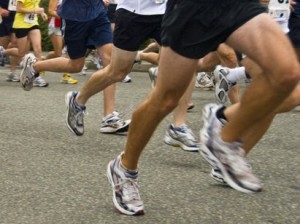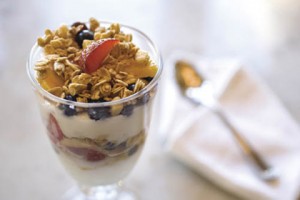 The Boston Marathon is just around the corner and I find myself thinking of my many friends and clients who will be participating. Athletes across the country are busy training for this and many other endurance events in the coming months. Triathletes, cyclists, runners, hikers, mountain climbers, and so many others are figuring out how to get the most of their training to maximize their performance. Whether you are a novice just hoping to complete your 1st event or a veteran striving for a personal record (PR), one detail that can make the difference between achieving your goal or falling short of it is your nutrition and hydration plan.
The Boston Marathon is just around the corner and I find myself thinking of my many friends and clients who will be participating. Athletes across the country are busy training for this and many other endurance events in the coming months. Triathletes, cyclists, runners, hikers, mountain climbers, and so many others are figuring out how to get the most of their training to maximize their performance. Whether you are a novice just hoping to complete your 1st event or a veteran striving for a personal record (PR), one detail that can make the difference between achieving your goal or falling short of it is your nutrition and hydration plan.
Endurance athletes often have a love/hate relationship with food. Most love to eat, but there is a common fear of over-eating and gaining weight… which they believe will slow them down. While it is true that having excessive body fat may give unwanted “baggage” to cart around, not all weight is created equal. In the end, it’s not body weight that’s important, but rather an athlete’s power-to-weight-ratio. My favorite example of this is to compare a VW Beetle, and a NASCAR. Which one is lighter and which one goes faster? Though the Beetle is lighter, the NASCAR is clearly faster…because it has a more powerful engine and quality fuel. For endurance athletes, muscles are the “engines” that make the body go. So if additional body weight is due to muscles (which by the way, are 3 times as heavy as an equal volume of fat), there is not necessarily any disadvantage to having this “extra” weight. It simply means you have a bigger engine, which should work to your advantage….IF you fuel it well. If the driver of a NASCAR is afraid that the added weight of fuel will slow him down, he may start out the race with less than a full tank of fuel, but not have enough fuel for a strong finish – or worse, may run out of gas before he is able to finish. The better strategy is to start with a full tank, knowing that 1) the load will lighten as the fuel is burned, and 2) there will be enough fuel on board to finish strong. Did you know that when a NASCAR crosses the Start line about 1/3 of it’s weight is fuel? (And they continue to stop to refuel throughout the race.) And yet, this is what wins races. Likewise, for endurance athletes, loading up on fuel prior to the start of an event and refueling during the event can be the advantage that boosts their performance.
Though a well trained endurance athlete can use fat as a fuel very effectively, there is always a need for a baseline amount carbohydrates to fuel performance. In essence, the body requires a fuel mix to keep going strong. Carbohydrate is the preferred fuel for about the 1st 20 minutes of endurance (aerobic) exercise, and for any exertion thereafter that leaves the athlete panting (i.e. pushing up a hill, against the wind, or sprinting to the finish). After about the 1st 20 minutes of steady state exercise, the body starts to effectively use fat as a primary fuel source. The more well trained the athlete is for endurance, the larger the percentage of energy that will come from fat (up to 70%-75% in elite athletes). And yet, when the body runs out of carbohydrate, performance will wane and then fail (“bonk” or “hit the wall”).

During an event carbohydrate comes from 3 primary sources: 1) what was eaten prior to the event, 2) what is stored in body, and 3)what is consumed during the event. The 1st source, though important, will be short lived. An athletes can only realistically eat so much prior to a race without causing gastrointestinal distress. You can look at it as a means of “topping off the tank” before hitting the road. The second source is glycogen. Plants store carbohydrate as starch; animals store it as glycogen. Glycogen is stored in our muscles and our liver, and is converted as needed to glucose. Glucose (blood sugar) is what fuels the brain and provides a critical 25% –40% of fuel for the muscles. It is a very clean source of fuel that is easily utilized by the body. When an athlete runs out of glycogen, he/she “bonks” and cannot continue. Thus it is very important to maximize one’s glycogen stores by consuming adequate carbohydrate on a daily basis, and especially during recovery after training and events that last over an hour. To maximize glycogen stores (and hence endurance), it is recommended endurance athletes consume 5 to 7 grams carbohydrate per kilogram body weight (2.3 to 3 gm per pound), and ultra-endurance athletes consume 7 to 12 grams carbohydrate per kg body weight (3 to 5.5 gm per pound). In my experience, unless athletes are consciously trying to do this, they generally fall short. Some are talented enough that they “get away with it”… but they don’t maximize their performance. Having enough glycogen at the end of an event may be the difference between finishing okay and finishing strong (or not finishing). Glycogen is heavy since it is stored with water, but as with the NASCAR, the additional weight at the start of a race is part of the strategy for finishing strong without having to refuel as much during the race. The importance of the  third source of carbs (those consumed during exercise) is often minimized by athletes who feel they do “fine” without refueling much during the event. That is often a mistake that prevents them from being able to achieve a desired PR, and likely makes the end of the event much more difficult than need be. Fueling during an event provides an additional source of fuel that prevents glycogen stores from being drained too rapidly…which is critical to finishing strong. The recommendation is to consume 30-60 gm carbs per hour, which can easily be done with snacks, sports drinks, gels and sports chews. To prevent gastrointestinal problems, be sure to drink enough water along with the carbs to maximize their absorption. (See Exercise-Induced “Food Intolerances” and Sports Drinks: What’s in your bottle?? for more information.) So, if you are training for events this season consider how your nutrition strategies will take advantage of all 3 sources of carbohydrate to fuel your training and events. For help translating all this into daily food choices, work with a Board Certified Specialist in Sports Dietetics (CSSD) to develop a winning sports nutrition plan tailored to your needs and preferences. (find a sports nutritionist)
third source of carbs (those consumed during exercise) is often minimized by athletes who feel they do “fine” without refueling much during the event. That is often a mistake that prevents them from being able to achieve a desired PR, and likely makes the end of the event much more difficult than need be. Fueling during an event provides an additional source of fuel that prevents glycogen stores from being drained too rapidly…which is critical to finishing strong. The recommendation is to consume 30-60 gm carbs per hour, which can easily be done with snacks, sports drinks, gels and sports chews. To prevent gastrointestinal problems, be sure to drink enough water along with the carbs to maximize their absorption. (See Exercise-Induced “Food Intolerances” and Sports Drinks: What’s in your bottle?? for more information.) So, if you are training for events this season consider how your nutrition strategies will take advantage of all 3 sources of carbohydrate to fuel your training and events. For help translating all this into daily food choices, work with a Board Certified Specialist in Sports Dietetics (CSSD) to develop a winning sports nutrition plan tailored to your needs and preferences. (find a sports nutritionist)
For additional information on preparing for endurance events, see Carb-Loading Tips (and other nutrition hints for endurance events) and Fueling for a Running Event: Race Day.

